Federation University: BULAW5916 Taxation Law and Shared Economy
VerifiedAdded on 2023/03/20
|9
|2590
|27
Essay
AI Summary
This essay examines the complexities of taxation law in the context of the shared economy, particularly focusing on the challenges and opportunities presented by platforms like Uber and Airbnb. The essay begins by defining the shared economy and its rapid growth, highlighting the potential for tax evasion and the subsequent impact on tax integrity and the welfare system. It explores the Australian Taxation Office's (ATO) efforts to address these issues through agreements with major platforms to collect taxpayer information and improve compliance. The essay analyzes the current tax environment, noting the lack of information and the challenges of ensuring that shared economy participants understand their tax obligations, especially given the prevalence of independent contractor relationships. The essay then discusses the ATO's strategies for gathering information, including reporting regimes and the use of data from ride-sharing and accommodation platforms. Recommendations are made for improving tax obligations, including the implementation of new reporting requirements and the potential for tax installment regimes. The essay concludes by emphasizing the benefits of the shared economy while stressing the importance of effective tax compliance to ensure revenue generation and fairness in the tax system. References to relevant news articles and academic papers are included to support the analysis.
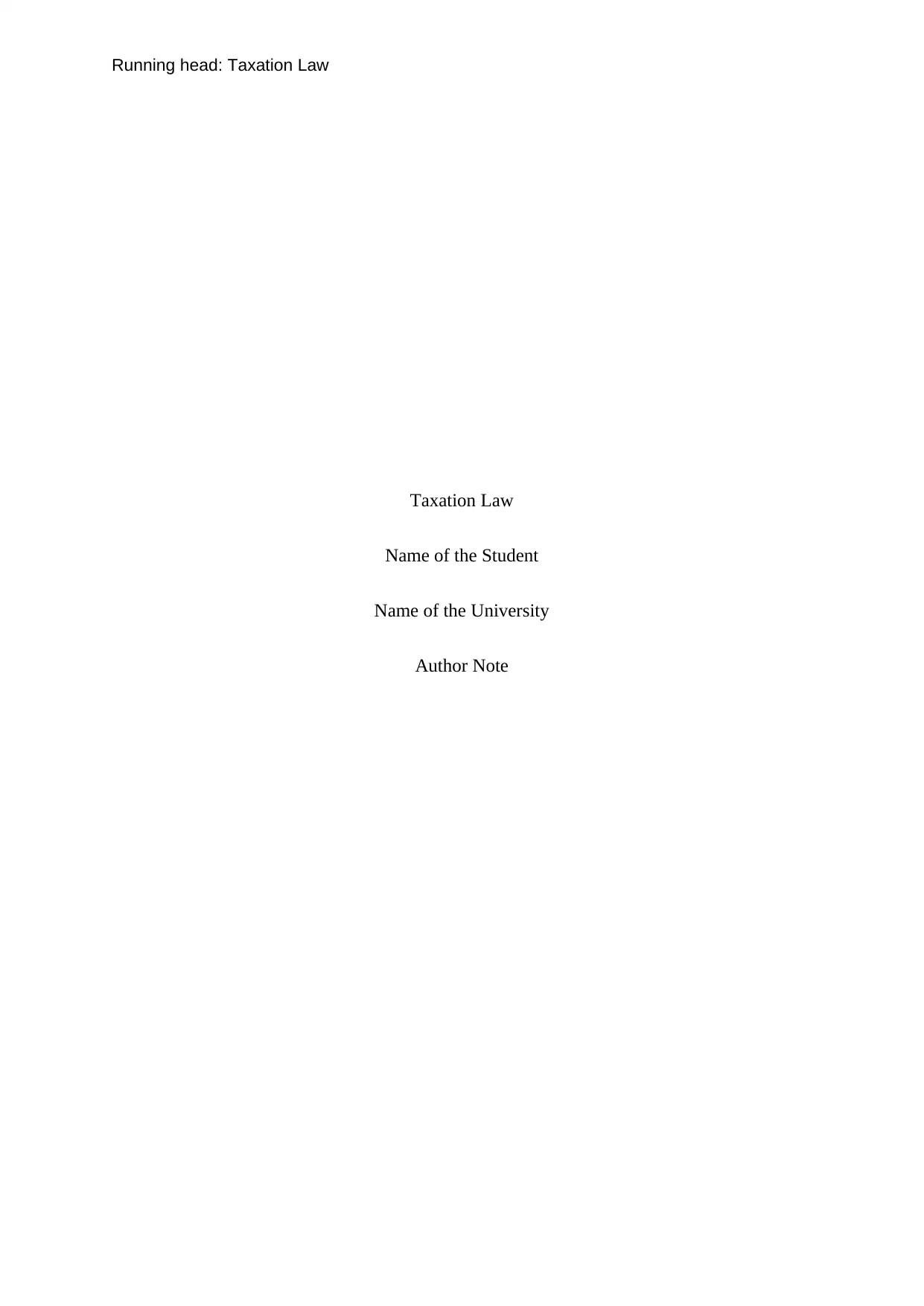
Running head: Taxation Law
Taxation Law
Name of the Student
Name of the University
Author Note
Taxation Law
Name of the Student
Name of the University
Author Note
Paraphrase This Document
Need a fresh take? Get an instant paraphrase of this document with our AI Paraphraser
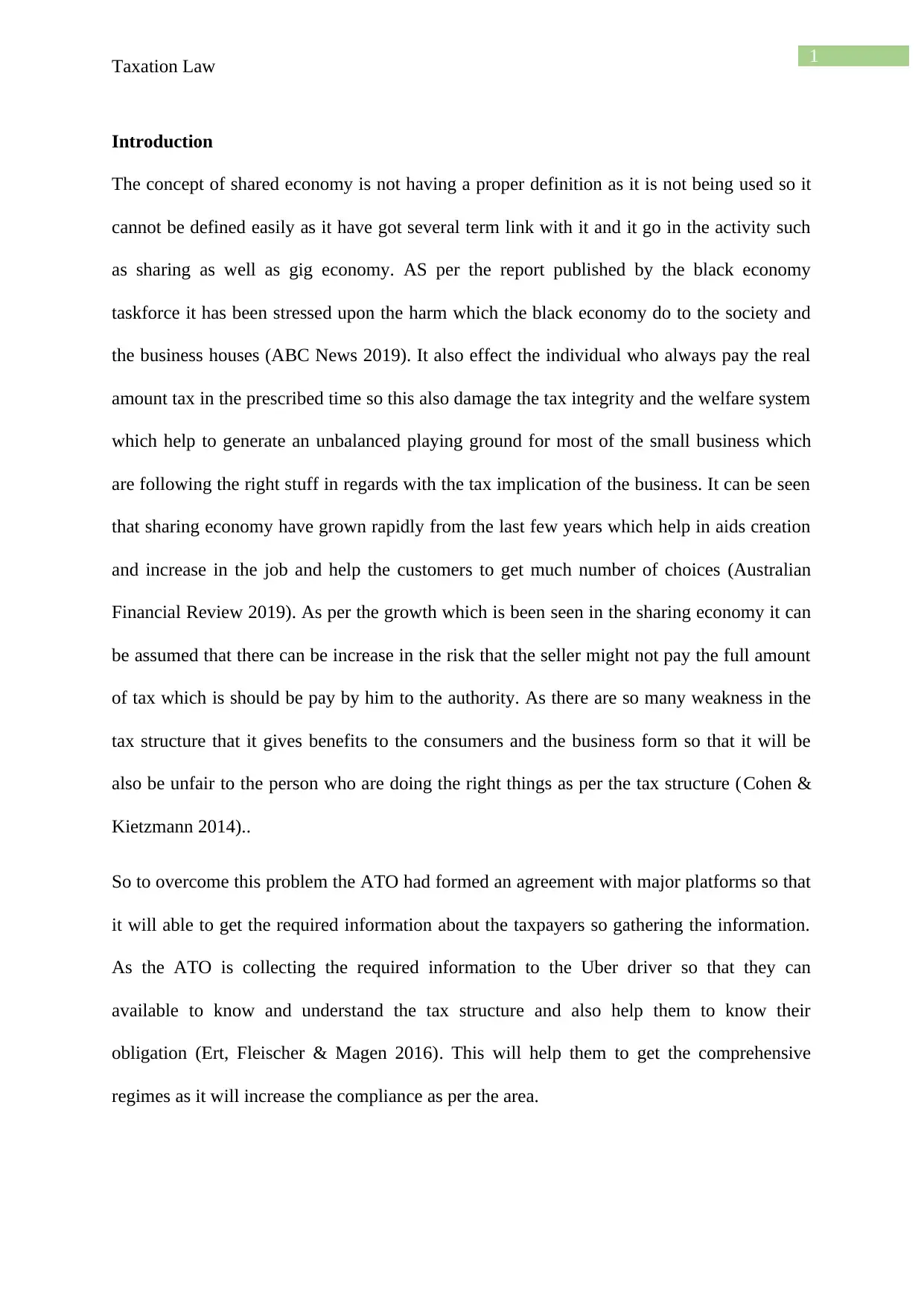
1
Taxation Law
Introduction
The concept of shared economy is not having a proper definition as it is not being used so it
cannot be defined easily as it have got several term link with it and it go in the activity such
as sharing as well as gig economy. AS per the report published by the black economy
taskforce it has been stressed upon the harm which the black economy do to the society and
the business houses (ABC News 2019). It also effect the individual who always pay the real
amount tax in the prescribed time so this also damage the tax integrity and the welfare system
which help to generate an unbalanced playing ground for most of the small business which
are following the right stuff in regards with the tax implication of the business. It can be seen
that sharing economy have grown rapidly from the last few years which help in aids creation
and increase in the job and help the customers to get much number of choices (Australian
Financial Review 2019). As per the growth which is been seen in the sharing economy it can
be assumed that there can be increase in the risk that the seller might not pay the full amount
of tax which is should be pay by him to the authority. As there are so many weakness in the
tax structure that it gives benefits to the consumers and the business form so that it will be
also be unfair to the person who are doing the right things as per the tax structure (Cohen &
Kietzmann 2014)..
So to overcome this problem the ATO had formed an agreement with major platforms so that
it will able to get the required information about the taxpayers so gathering the information.
As the ATO is collecting the required information to the Uber driver so that they can
available to know and understand the tax structure and also help them to know their
obligation (Ert, Fleischer & Magen 2016). This will help them to get the comprehensive
regimes as it will increase the compliance as per the area.
Taxation Law
Introduction
The concept of shared economy is not having a proper definition as it is not being used so it
cannot be defined easily as it have got several term link with it and it go in the activity such
as sharing as well as gig economy. AS per the report published by the black economy
taskforce it has been stressed upon the harm which the black economy do to the society and
the business houses (ABC News 2019). It also effect the individual who always pay the real
amount tax in the prescribed time so this also damage the tax integrity and the welfare system
which help to generate an unbalanced playing ground for most of the small business which
are following the right stuff in regards with the tax implication of the business. It can be seen
that sharing economy have grown rapidly from the last few years which help in aids creation
and increase in the job and help the customers to get much number of choices (Australian
Financial Review 2019). As per the growth which is been seen in the sharing economy it can
be assumed that there can be increase in the risk that the seller might not pay the full amount
of tax which is should be pay by him to the authority. As there are so many weakness in the
tax structure that it gives benefits to the consumers and the business form so that it will be
also be unfair to the person who are doing the right things as per the tax structure (Cohen &
Kietzmann 2014)..
So to overcome this problem the ATO had formed an agreement with major platforms so that
it will able to get the required information about the taxpayers so gathering the information.
As the ATO is collecting the required information to the Uber driver so that they can
available to know and understand the tax structure and also help them to know their
obligation (Ert, Fleischer & Magen 2016). This will help them to get the comprehensive
regimes as it will increase the compliance as per the area.
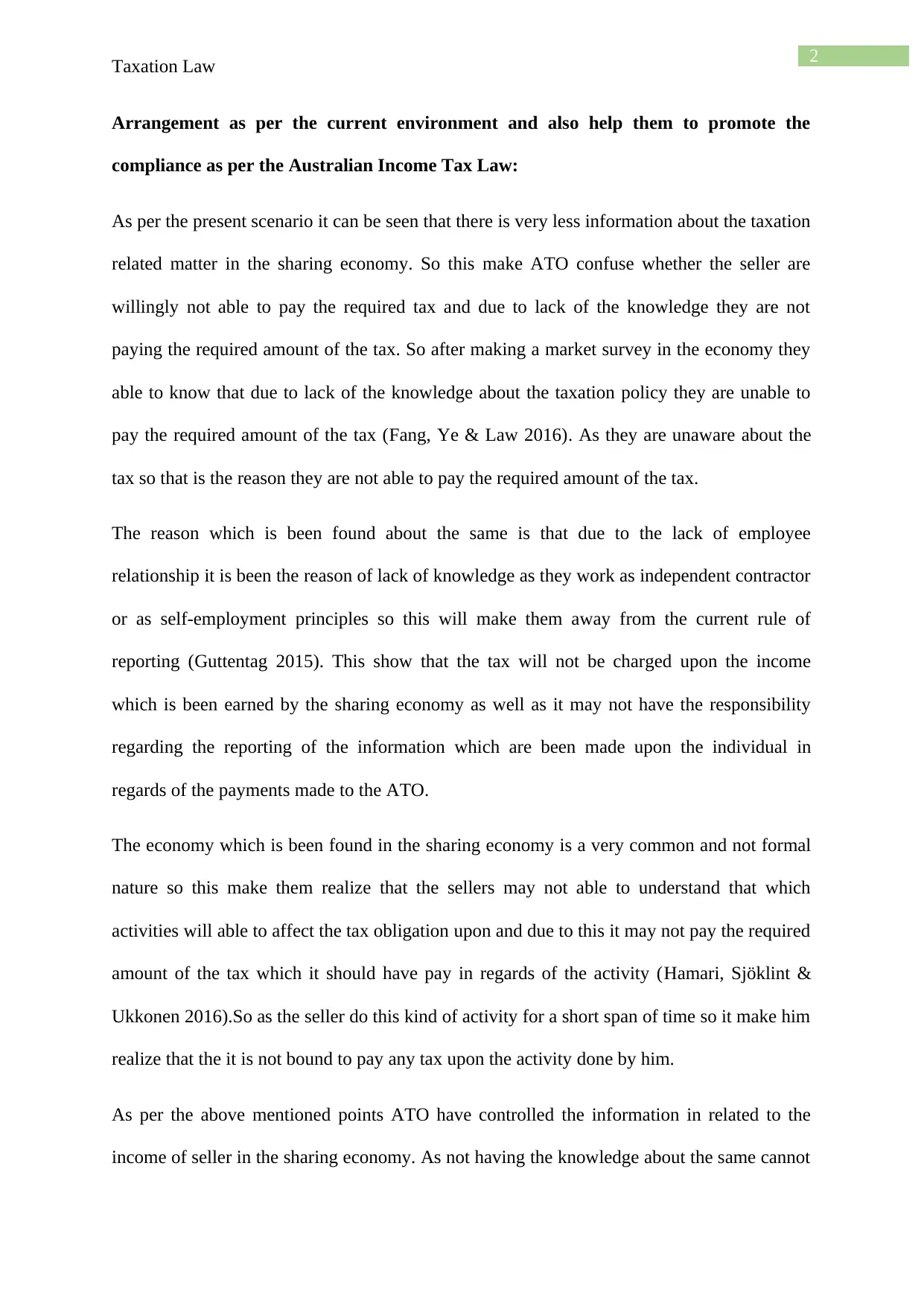
2
Taxation Law
Arrangement as per the current environment and also help them to promote the
compliance as per the Australian Income Tax Law:
As per the present scenario it can be seen that there is very less information about the taxation
related matter in the sharing economy. So this make ATO confuse whether the seller are
willingly not able to pay the required tax and due to lack of the knowledge they are not
paying the required amount of the tax. So after making a market survey in the economy they
able to know that due to lack of the knowledge about the taxation policy they are unable to
pay the required amount of the tax (Fang, Ye & Law 2016). As they are unaware about the
tax so that is the reason they are not able to pay the required amount of the tax.
The reason which is been found about the same is that due to the lack of employee
relationship it is been the reason of lack of knowledge as they work as independent contractor
or as self-employment principles so this will make them away from the current rule of
reporting (Guttentag 2015). This show that the tax will not be charged upon the income
which is been earned by the sharing economy as well as it may not have the responsibility
regarding the reporting of the information which are been made upon the individual in
regards of the payments made to the ATO.
The economy which is been found in the sharing economy is a very common and not formal
nature so this make them realize that the sellers may not able to understand that which
activities will able to affect the tax obligation upon and due to this it may not pay the required
amount of the tax which it should have pay in regards of the activity (Hamari, Sjöklint &
Ukkonen 2016).So as the seller do this kind of activity for a short span of time so it make him
realize that the it is not bound to pay any tax upon the activity done by him.
As per the above mentioned points ATO have controlled the information in related to the
income of seller in the sharing economy. As not having the knowledge about the same cannot
Taxation Law
Arrangement as per the current environment and also help them to promote the
compliance as per the Australian Income Tax Law:
As per the present scenario it can be seen that there is very less information about the taxation
related matter in the sharing economy. So this make ATO confuse whether the seller are
willingly not able to pay the required tax and due to lack of the knowledge they are not
paying the required amount of the tax. So after making a market survey in the economy they
able to know that due to lack of the knowledge about the taxation policy they are unable to
pay the required amount of the tax (Fang, Ye & Law 2016). As they are unaware about the
tax so that is the reason they are not able to pay the required amount of the tax.
The reason which is been found about the same is that due to the lack of employee
relationship it is been the reason of lack of knowledge as they work as independent contractor
or as self-employment principles so this will make them away from the current rule of
reporting (Guttentag 2015). This show that the tax will not be charged upon the income
which is been earned by the sharing economy as well as it may not have the responsibility
regarding the reporting of the information which are been made upon the individual in
regards of the payments made to the ATO.
The economy which is been found in the sharing economy is a very common and not formal
nature so this make them realize that the sellers may not able to understand that which
activities will able to affect the tax obligation upon and due to this it may not pay the required
amount of the tax which it should have pay in regards of the activity (Hamari, Sjöklint &
Ukkonen 2016).So as the seller do this kind of activity for a short span of time so it make him
realize that the it is not bound to pay any tax upon the activity done by him.
As per the above mentioned points ATO have controlled the information in related to the
income of seller in the sharing economy. As not having the knowledge about the same cannot
⊘ This is a preview!⊘
Do you want full access?
Subscribe today to unlock all pages.

Trusted by 1+ million students worldwide
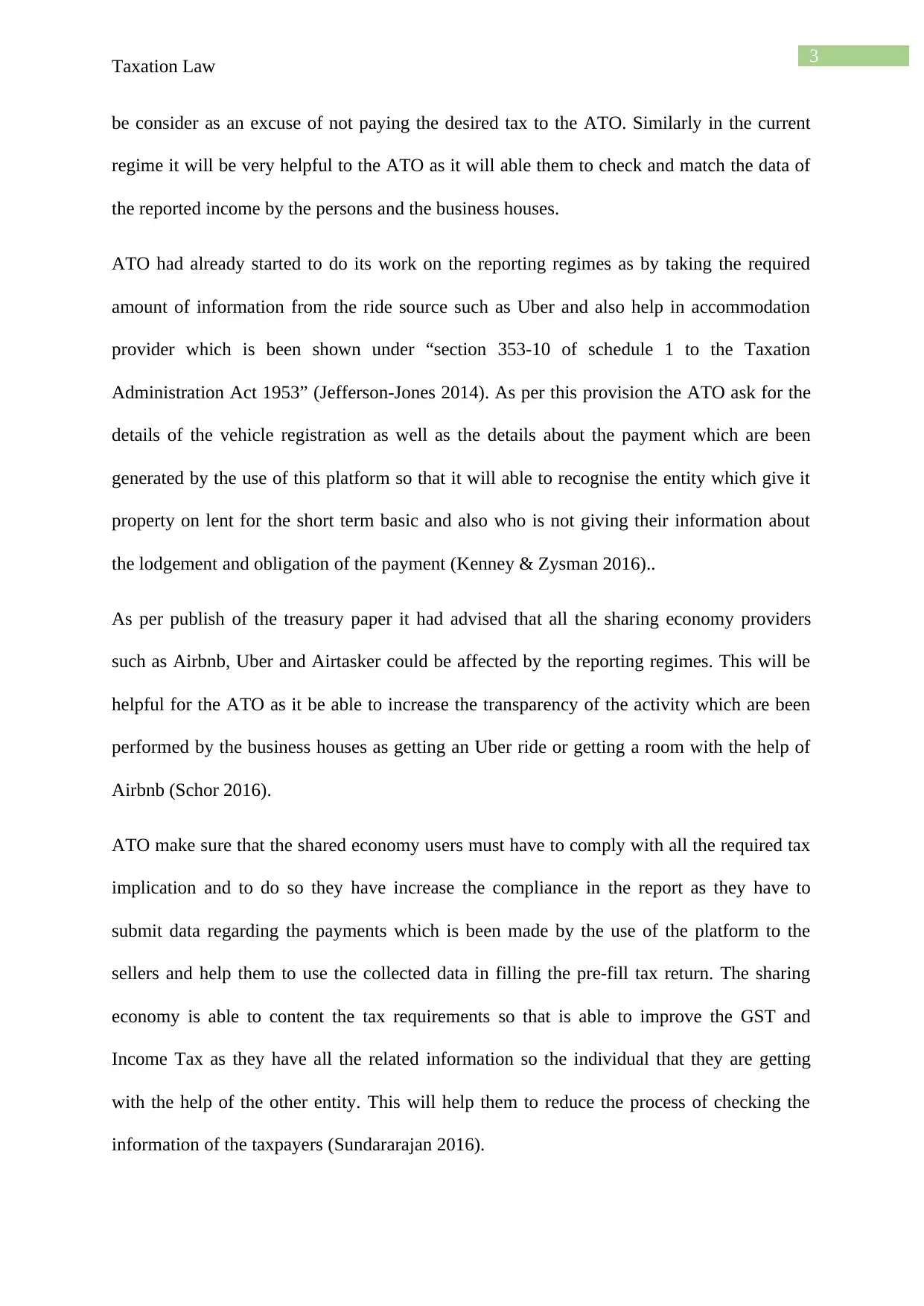
3
Taxation Law
be consider as an excuse of not paying the desired tax to the ATO. Similarly in the current
regime it will be very helpful to the ATO as it will able them to check and match the data of
the reported income by the persons and the business houses.
ATO had already started to do its work on the reporting regimes as by taking the required
amount of information from the ride source such as Uber and also help in accommodation
provider which is been shown under “section 353-10 of schedule 1 to the Taxation
Administration Act 1953” (Jefferson-Jones 2014). As per this provision the ATO ask for the
details of the vehicle registration as well as the details about the payment which are been
generated by the use of this platform so that it will able to recognise the entity which give it
property on lent for the short term basic and also who is not giving their information about
the lodgement and obligation of the payment (Kenney & Zysman 2016)..
As per publish of the treasury paper it had advised that all the sharing economy providers
such as Airbnb, Uber and Airtasker could be affected by the reporting regimes. This will be
helpful for the ATO as it be able to increase the transparency of the activity which are been
performed by the business houses as getting an Uber ride or getting a room with the help of
Airbnb (Schor 2016).
ATO make sure that the shared economy users must have to comply with all the required tax
implication and to do so they have increase the compliance in the report as they have to
submit data regarding the payments which is been made by the use of the platform to the
sellers and help them to use the collected data in filling the pre-fill tax return. The sharing
economy is able to content the tax requirements so that is able to improve the GST and
Income Tax as they have all the related information so the individual that they are getting
with the help of the other entity. This will help them to reduce the process of checking the
information of the taxpayers (Sundararajan 2016).
Taxation Law
be consider as an excuse of not paying the desired tax to the ATO. Similarly in the current
regime it will be very helpful to the ATO as it will able them to check and match the data of
the reported income by the persons and the business houses.
ATO had already started to do its work on the reporting regimes as by taking the required
amount of information from the ride source such as Uber and also help in accommodation
provider which is been shown under “section 353-10 of schedule 1 to the Taxation
Administration Act 1953” (Jefferson-Jones 2014). As per this provision the ATO ask for the
details of the vehicle registration as well as the details about the payment which are been
generated by the use of this platform so that it will able to recognise the entity which give it
property on lent for the short term basic and also who is not giving their information about
the lodgement and obligation of the payment (Kenney & Zysman 2016)..
As per publish of the treasury paper it had advised that all the sharing economy providers
such as Airbnb, Uber and Airtasker could be affected by the reporting regimes. This will be
helpful for the ATO as it be able to increase the transparency of the activity which are been
performed by the business houses as getting an Uber ride or getting a room with the help of
Airbnb (Schor 2016).
ATO make sure that the shared economy users must have to comply with all the required tax
implication and to do so they have increase the compliance in the report as they have to
submit data regarding the payments which is been made by the use of the platform to the
sellers and help them to use the collected data in filling the pre-fill tax return. The sharing
economy is able to content the tax requirements so that is able to improve the GST and
Income Tax as they have all the related information so the individual that they are getting
with the help of the other entity. This will help them to reduce the process of checking the
information of the taxpayers (Sundararajan 2016).
Paraphrase This Document
Need a fresh take? Get an instant paraphrase of this document with our AI Paraphraser
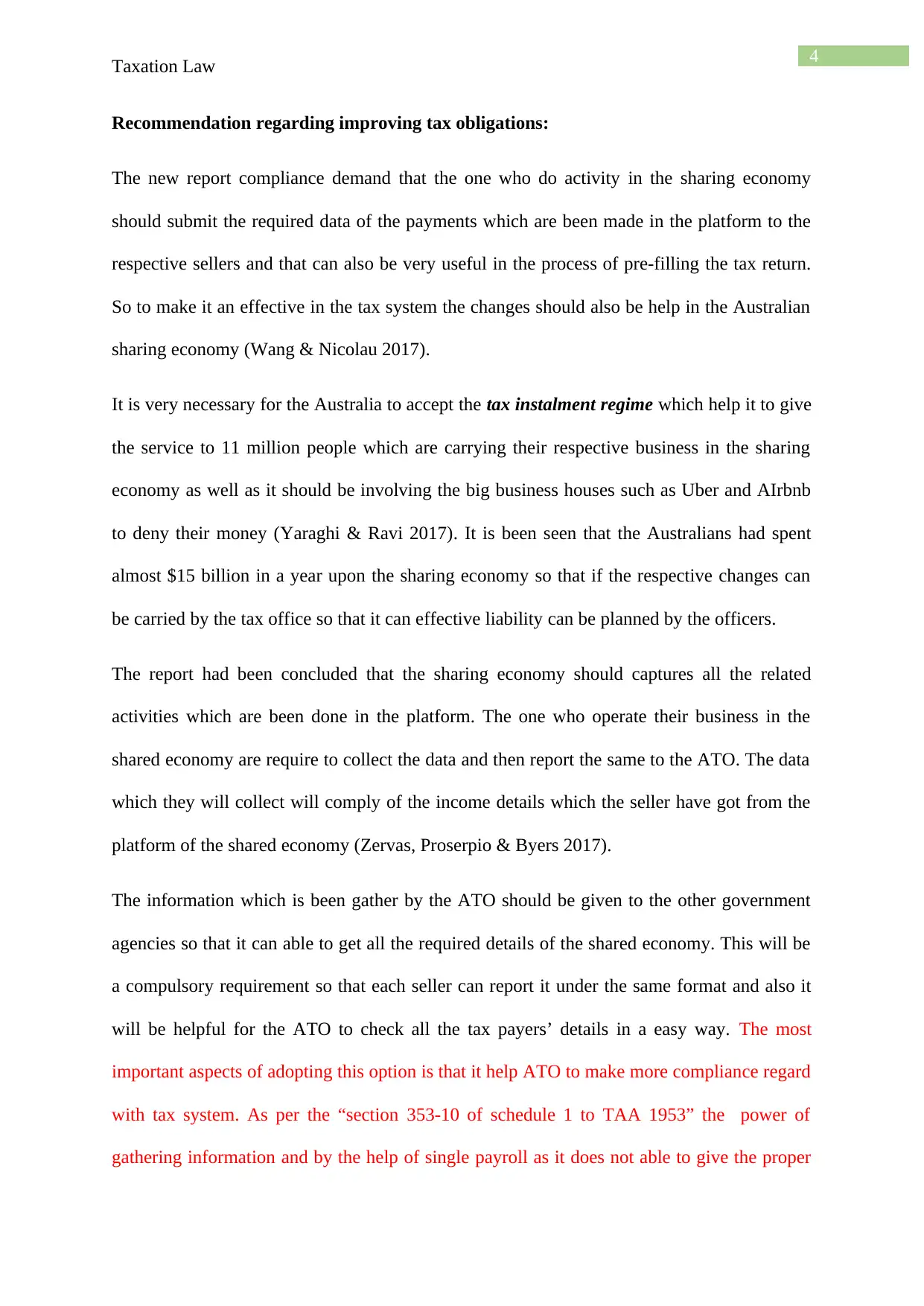
4
Taxation Law
Recommendation regarding improving tax obligations:
The new report compliance demand that the one who do activity in the sharing economy
should submit the required data of the payments which are been made in the platform to the
respective sellers and that can also be very useful in the process of pre-filling the tax return.
So to make it an effective in the tax system the changes should also be help in the Australian
sharing economy (Wang & Nicolau 2017).
It is very necessary for the Australia to accept the tax instalment regime which help it to give
the service to 11 million people which are carrying their respective business in the sharing
economy as well as it should be involving the big business houses such as Uber and AIrbnb
to deny their money (Yaraghi & Ravi 2017). It is been seen that the Australians had spent
almost $15 billion in a year upon the sharing economy so that if the respective changes can
be carried by the tax office so that it can effective liability can be planned by the officers.
The report had been concluded that the sharing economy should captures all the related
activities which are been done in the platform. The one who operate their business in the
shared economy are require to collect the data and then report the same to the ATO. The data
which they will collect will comply of the income details which the seller have got from the
platform of the shared economy (Zervas, Proserpio & Byers 2017).
The information which is been gather by the ATO should be given to the other government
agencies so that it can able to get all the required details of the shared economy. This will be
a compulsory requirement so that each seller can report it under the same format and also it
will be helpful for the ATO to check all the tax payers’ details in a easy way. The most
important aspects of adopting this option is that it help ATO to make more compliance regard
with tax system. As per the “section 353-10 of schedule 1 to TAA 1953” the power of
gathering information and by the help of single payroll as it does not able to give the proper
Taxation Law
Recommendation regarding improving tax obligations:
The new report compliance demand that the one who do activity in the sharing economy
should submit the required data of the payments which are been made in the platform to the
respective sellers and that can also be very useful in the process of pre-filling the tax return.
So to make it an effective in the tax system the changes should also be help in the Australian
sharing economy (Wang & Nicolau 2017).
It is very necessary for the Australia to accept the tax instalment regime which help it to give
the service to 11 million people which are carrying their respective business in the sharing
economy as well as it should be involving the big business houses such as Uber and AIrbnb
to deny their money (Yaraghi & Ravi 2017). It is been seen that the Australians had spent
almost $15 billion in a year upon the sharing economy so that if the respective changes can
be carried by the tax office so that it can effective liability can be planned by the officers.
The report had been concluded that the sharing economy should captures all the related
activities which are been done in the platform. The one who operate their business in the
shared economy are require to collect the data and then report the same to the ATO. The data
which they will collect will comply of the income details which the seller have got from the
platform of the shared economy (Zervas, Proserpio & Byers 2017).
The information which is been gather by the ATO should be given to the other government
agencies so that it can able to get all the required details of the shared economy. This will be
a compulsory requirement so that each seller can report it under the same format and also it
will be helpful for the ATO to check all the tax payers’ details in a easy way. The most
important aspects of adopting this option is that it help ATO to make more compliance regard
with tax system. As per the “section 353-10 of schedule 1 to TAA 1953” the power of
gathering information and by the help of single payroll as it does not able to give the proper
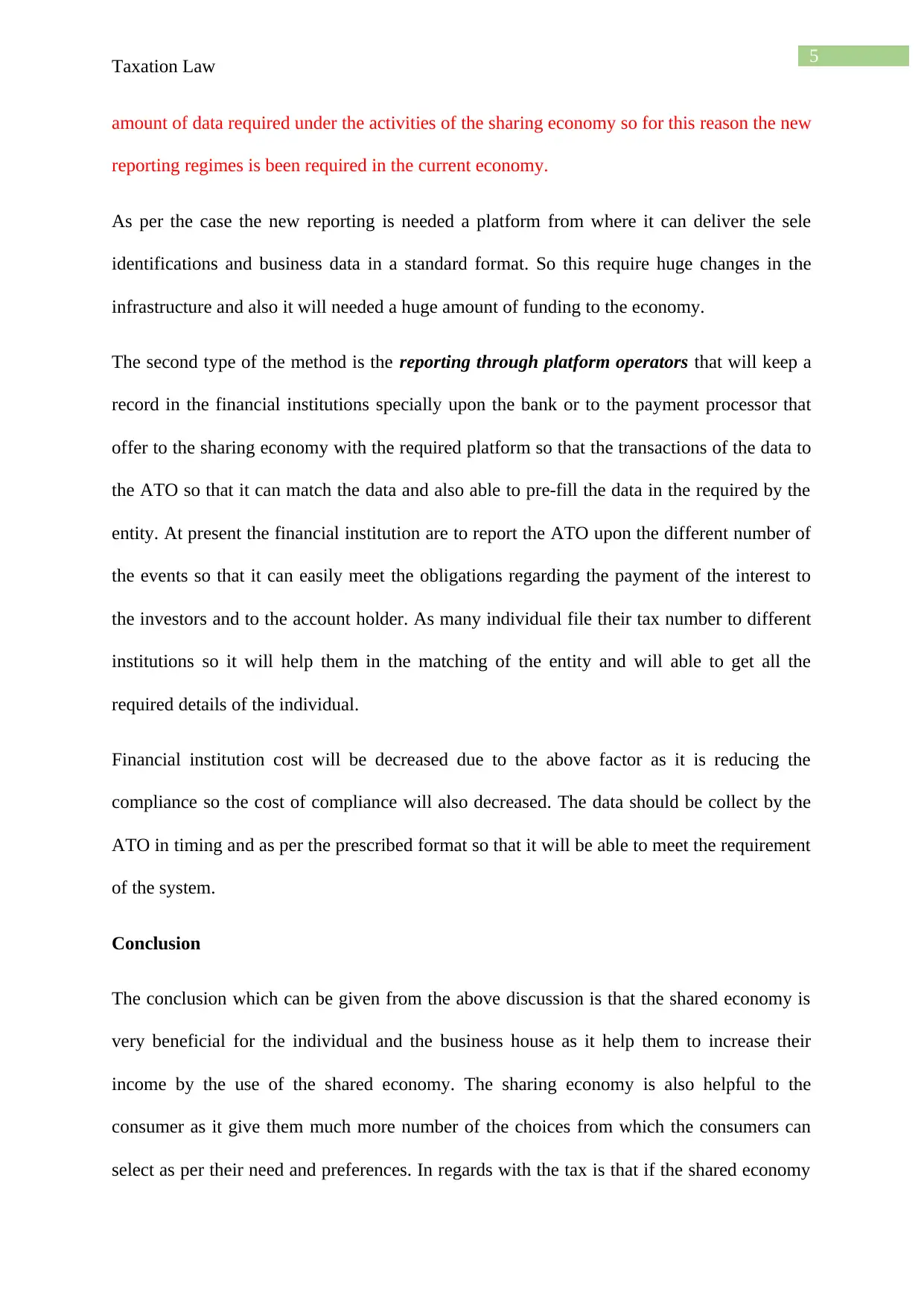
5
Taxation Law
amount of data required under the activities of the sharing economy so for this reason the new
reporting regimes is been required in the current economy.
As per the case the new reporting is needed a platform from where it can deliver the sele
identifications and business data in a standard format. So this require huge changes in the
infrastructure and also it will needed a huge amount of funding to the economy.
The second type of the method is the reporting through platform operators that will keep a
record in the financial institutions specially upon the bank or to the payment processor that
offer to the sharing economy with the required platform so that the transactions of the data to
the ATO so that it can match the data and also able to pre-fill the data in the required by the
entity. At present the financial institution are to report the ATO upon the different number of
the events so that it can easily meet the obligations regarding the payment of the interest to
the investors and to the account holder. As many individual file their tax number to different
institutions so it will help them in the matching of the entity and will able to get all the
required details of the individual.
Financial institution cost will be decreased due to the above factor as it is reducing the
compliance so the cost of compliance will also decreased. The data should be collect by the
ATO in timing and as per the prescribed format so that it will be able to meet the requirement
of the system.
Conclusion
The conclusion which can be given from the above discussion is that the shared economy is
very beneficial for the individual and the business house as it help them to increase their
income by the use of the shared economy. The sharing economy is also helpful to the
consumer as it give them much more number of the choices from which the consumers can
select as per their need and preferences. In regards with the tax is that if the shared economy
Taxation Law
amount of data required under the activities of the sharing economy so for this reason the new
reporting regimes is been required in the current economy.
As per the case the new reporting is needed a platform from where it can deliver the sele
identifications and business data in a standard format. So this require huge changes in the
infrastructure and also it will needed a huge amount of funding to the economy.
The second type of the method is the reporting through platform operators that will keep a
record in the financial institutions specially upon the bank or to the payment processor that
offer to the sharing economy with the required platform so that the transactions of the data to
the ATO so that it can match the data and also able to pre-fill the data in the required by the
entity. At present the financial institution are to report the ATO upon the different number of
the events so that it can easily meet the obligations regarding the payment of the interest to
the investors and to the account holder. As many individual file their tax number to different
institutions so it will help them in the matching of the entity and will able to get all the
required details of the individual.
Financial institution cost will be decreased due to the above factor as it is reducing the
compliance so the cost of compliance will also decreased. The data should be collect by the
ATO in timing and as per the prescribed format so that it will be able to meet the requirement
of the system.
Conclusion
The conclusion which can be given from the above discussion is that the shared economy is
very beneficial for the individual and the business house as it help them to increase their
income by the use of the shared economy. The sharing economy is also helpful to the
consumer as it give them much more number of the choices from which the consumers can
select as per their need and preferences. In regards with the tax is that if the shared economy
⊘ This is a preview!⊘
Do you want full access?
Subscribe today to unlock all pages.

Trusted by 1+ million students worldwide
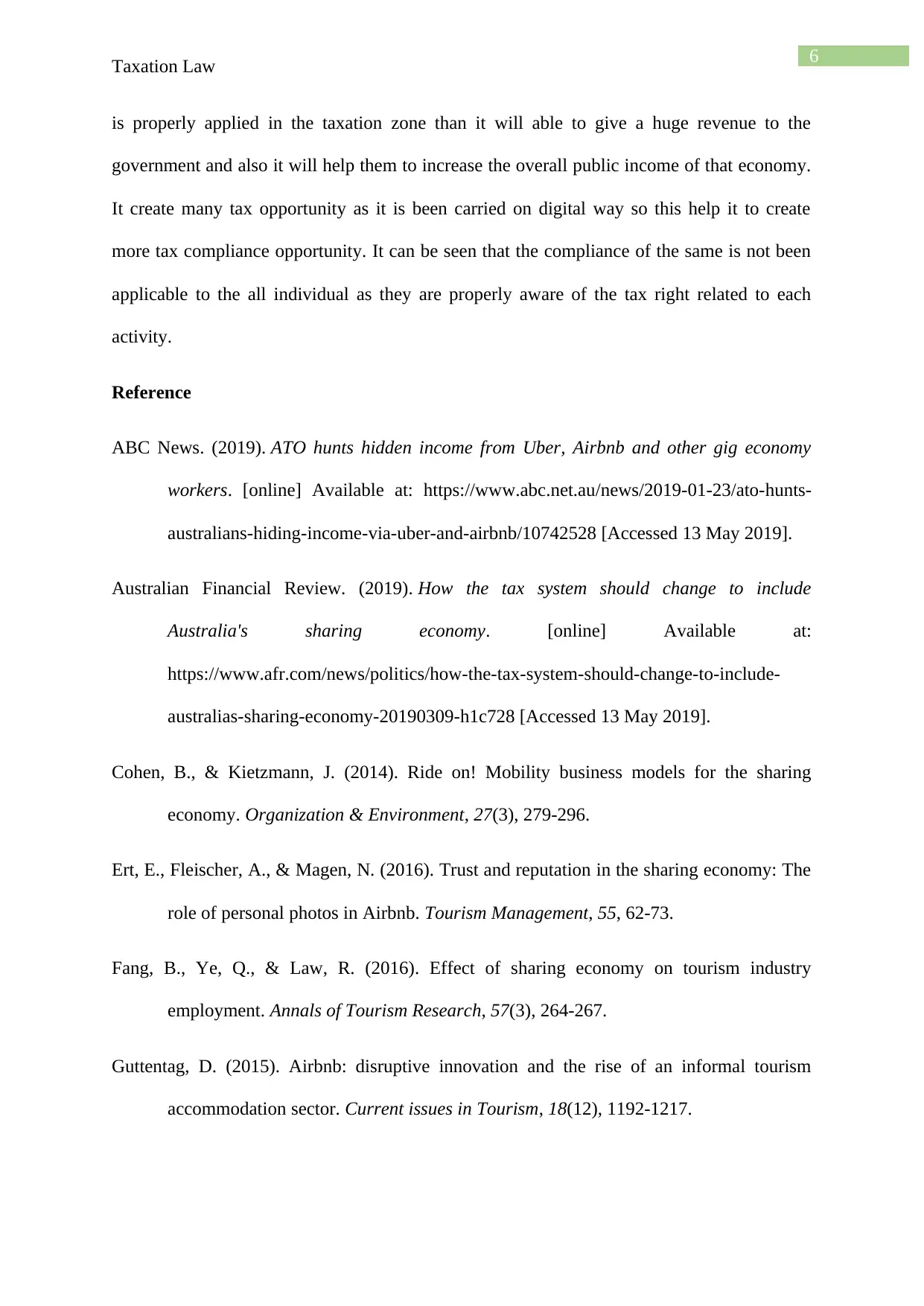
6
Taxation Law
is properly applied in the taxation zone than it will able to give a huge revenue to the
government and also it will help them to increase the overall public income of that economy.
It create many tax opportunity as it is been carried on digital way so this help it to create
more tax compliance opportunity. It can be seen that the compliance of the same is not been
applicable to the all individual as they are properly aware of the tax right related to each
activity.
Reference
ABC News. (2019). ATO hunts hidden income from Uber, Airbnb and other gig economy
workers. [online] Available at: https://www.abc.net.au/news/2019-01-23/ato-hunts-
australians-hiding-income-via-uber-and-airbnb/10742528 [Accessed 13 May 2019].
Australian Financial Review. (2019). How the tax system should change to include
Australia's sharing economy. [online] Available at:
https://www.afr.com/news/politics/how-the-tax-system-should-change-to-include-
australias-sharing-economy-20190309-h1c728 [Accessed 13 May 2019].
Cohen, B., & Kietzmann, J. (2014). Ride on! Mobility business models for the sharing
economy. Organization & Environment, 27(3), 279-296.
Ert, E., Fleischer, A., & Magen, N. (2016). Trust and reputation in the sharing economy: The
role of personal photos in Airbnb. Tourism Management, 55, 62-73.
Fang, B., Ye, Q., & Law, R. (2016). Effect of sharing economy on tourism industry
employment. Annals of Tourism Research, 57(3), 264-267.
Guttentag, D. (2015). Airbnb: disruptive innovation and the rise of an informal tourism
accommodation sector. Current issues in Tourism, 18(12), 1192-1217.
Taxation Law
is properly applied in the taxation zone than it will able to give a huge revenue to the
government and also it will help them to increase the overall public income of that economy.
It create many tax opportunity as it is been carried on digital way so this help it to create
more tax compliance opportunity. It can be seen that the compliance of the same is not been
applicable to the all individual as they are properly aware of the tax right related to each
activity.
Reference
ABC News. (2019). ATO hunts hidden income from Uber, Airbnb and other gig economy
workers. [online] Available at: https://www.abc.net.au/news/2019-01-23/ato-hunts-
australians-hiding-income-via-uber-and-airbnb/10742528 [Accessed 13 May 2019].
Australian Financial Review. (2019). How the tax system should change to include
Australia's sharing economy. [online] Available at:
https://www.afr.com/news/politics/how-the-tax-system-should-change-to-include-
australias-sharing-economy-20190309-h1c728 [Accessed 13 May 2019].
Cohen, B., & Kietzmann, J. (2014). Ride on! Mobility business models for the sharing
economy. Organization & Environment, 27(3), 279-296.
Ert, E., Fleischer, A., & Magen, N. (2016). Trust and reputation in the sharing economy: The
role of personal photos in Airbnb. Tourism Management, 55, 62-73.
Fang, B., Ye, Q., & Law, R. (2016). Effect of sharing economy on tourism industry
employment. Annals of Tourism Research, 57(3), 264-267.
Guttentag, D. (2015). Airbnb: disruptive innovation and the rise of an informal tourism
accommodation sector. Current issues in Tourism, 18(12), 1192-1217.
Paraphrase This Document
Need a fresh take? Get an instant paraphrase of this document with our AI Paraphraser
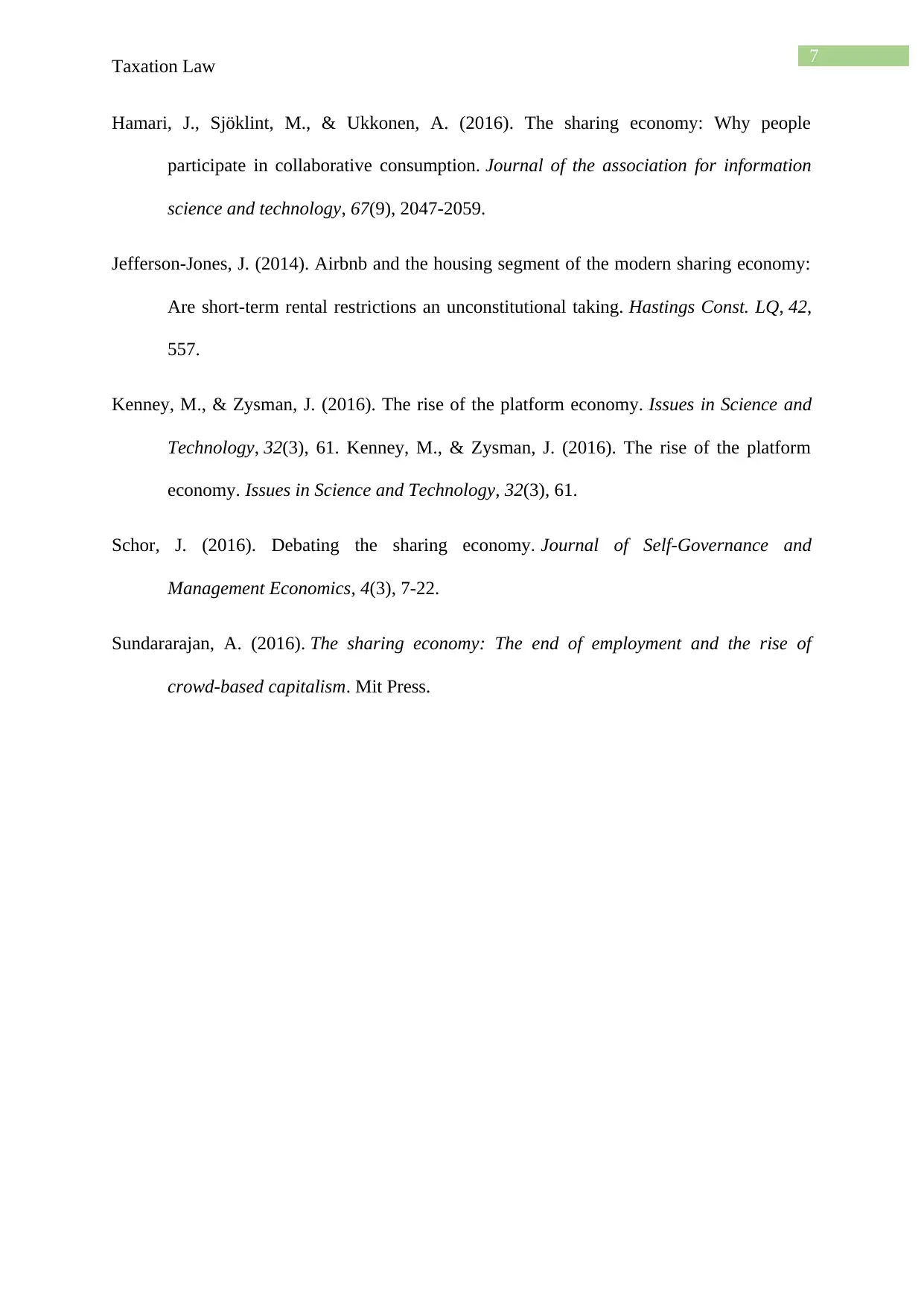
7
Taxation Law
Hamari, J., Sjöklint, M., & Ukkonen, A. (2016). The sharing economy: Why people
participate in collaborative consumption. Journal of the association for information
science and technology, 67(9), 2047-2059.
Jefferson-Jones, J. (2014). Airbnb and the housing segment of the modern sharing economy:
Are short-term rental restrictions an unconstitutional taking. Hastings Const. LQ, 42,
557.
Kenney, M., & Zysman, J. (2016). The rise of the platform economy. Issues in Science and
Technology, 32(3), 61. Kenney, M., & Zysman, J. (2016). The rise of the platform
economy. Issues in Science and Technology, 32(3), 61.
Schor, J. (2016). Debating the sharing economy. Journal of Self-Governance and
Management Economics, 4(3), 7-22.
Sundararajan, A. (2016). The sharing economy: The end of employment and the rise of
crowd-based capitalism. Mit Press.
Taxation Law
Hamari, J., Sjöklint, M., & Ukkonen, A. (2016). The sharing economy: Why people
participate in collaborative consumption. Journal of the association for information
science and technology, 67(9), 2047-2059.
Jefferson-Jones, J. (2014). Airbnb and the housing segment of the modern sharing economy:
Are short-term rental restrictions an unconstitutional taking. Hastings Const. LQ, 42,
557.
Kenney, M., & Zysman, J. (2016). The rise of the platform economy. Issues in Science and
Technology, 32(3), 61. Kenney, M., & Zysman, J. (2016). The rise of the platform
economy. Issues in Science and Technology, 32(3), 61.
Schor, J. (2016). Debating the sharing economy. Journal of Self-Governance and
Management Economics, 4(3), 7-22.
Sundararajan, A. (2016). The sharing economy: The end of employment and the rise of
crowd-based capitalism. Mit Press.
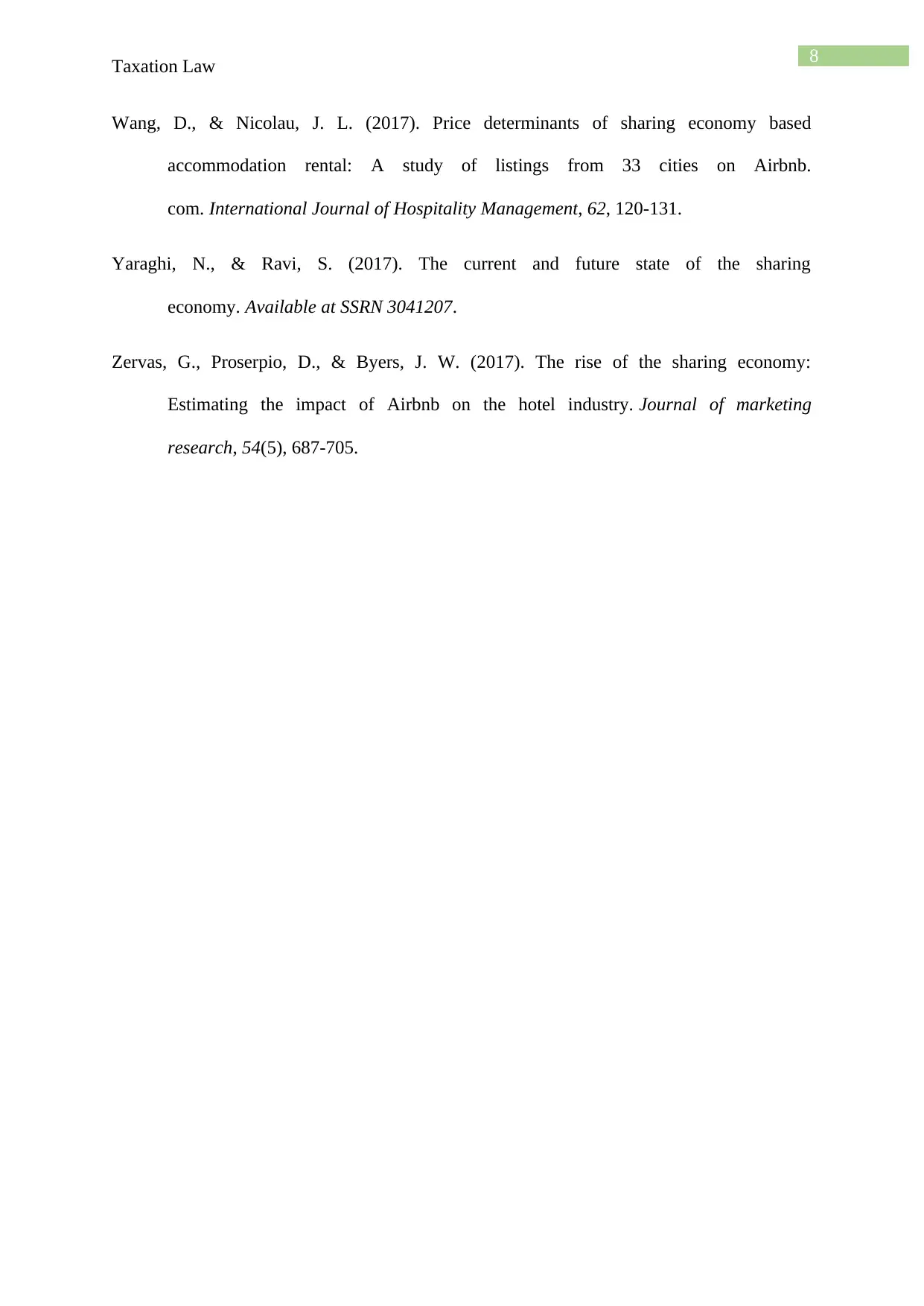
8
Taxation Law
Wang, D., & Nicolau, J. L. (2017). Price determinants of sharing economy based
accommodation rental: A study of listings from 33 cities on Airbnb.
com. International Journal of Hospitality Management, 62, 120-131.
Yaraghi, N., & Ravi, S. (2017). The current and future state of the sharing
economy. Available at SSRN 3041207.
Zervas, G., Proserpio, D., & Byers, J. W. (2017). The rise of the sharing economy:
Estimating the impact of Airbnb on the hotel industry. Journal of marketing
research, 54(5), 687-705.
Taxation Law
Wang, D., & Nicolau, J. L. (2017). Price determinants of sharing economy based
accommodation rental: A study of listings from 33 cities on Airbnb.
com. International Journal of Hospitality Management, 62, 120-131.
Yaraghi, N., & Ravi, S. (2017). The current and future state of the sharing
economy. Available at SSRN 3041207.
Zervas, G., Proserpio, D., & Byers, J. W. (2017). The rise of the sharing economy:
Estimating the impact of Airbnb on the hotel industry. Journal of marketing
research, 54(5), 687-705.
⊘ This is a preview!⊘
Do you want full access?
Subscribe today to unlock all pages.

Trusted by 1+ million students worldwide
1 out of 9
Related Documents
Your All-in-One AI-Powered Toolkit for Academic Success.
+13062052269
info@desklib.com
Available 24*7 on WhatsApp / Email
![[object Object]](/_next/static/media/star-bottom.7253800d.svg)
Unlock your academic potential
Copyright © 2020–2026 A2Z Services. All Rights Reserved. Developed and managed by ZUCOL.





